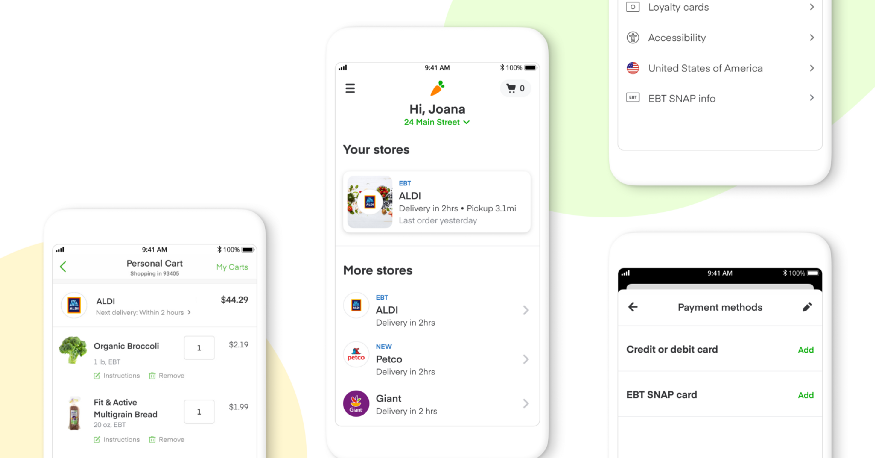
Grocery delivery platform Instacart is launching a pilot program to begin taking food stamps as payment in its app. The program will only be available at Aldi stores and only in a few states, starting with Georgia, then expanding to California, Florida, Illinois, and Pennsylvania.
Instacart said in a statement it is “committed to being a long-term solution for EBT SNAP households nationwide.” Brent Laubaugh, co-president of Aldi US said in a statement that the company was “eager to roll out this update broadly as quickly as possible,” hinting at possible future expansion.
During the pandemic demand for grocery delivery has skyrocketed
Customers can use the Instacart app to shop for SNAP-eligible products at Aldi. Once items are added to their cart, customers will be able to determine how much of their SNAP benefit to apply to their order total. And according to the USDA website (the federal agency that administers SNAP), the benefits can only be used for food, and plants and seeds to grow food. So SNAP can’t be used to cover any Instacart delivery fees, or tips.
During the pandemic demand for grocery and food deliveries from platforms like Instacart, Grubhub, and Shipt has skyrocketed, with Instacart telling CNBC in May its customer order volume was up 500 percent from the year before. Delivery companies scrambled to hire enough workers, and have been scrutinized for how they handle payments to restaurants, for their delivery driver payment and tipping systems, and also have faced criticism for failing to protect drivers—most of whom are contract workers ineligible for benefits— from contracting the coronavirus.
Most delivery platform apps aren’t equipped to accept food stamps, officially known as Supplemental Nutrition Assistance Program, or SNAP, as a universal form of payment, however. Walmart accepts SNAP in some states when picking up an online order, some Kroger locations accept SNAP payment for curbside pickups of online orders, and Amazon Prime lets users register their SNAP cards for online food purchases in most states.
SNAP, short for Supplemental Nutrition Assistance Program, is the biggest food assistance program in the US, and during the coronavirus pandemic the program has grown; between February and May it grew three times faster than it had in any three-month period, according to a New York Times analysis. The Families First Act, part of the US government’s emergency pandemic relief program which passed in March, temporarily reduced some of the administrative processing for SNAP applications to allow people to receive aid more quickly. An NPR analysis found that SNAP expanded by around 40 percent as a result.
